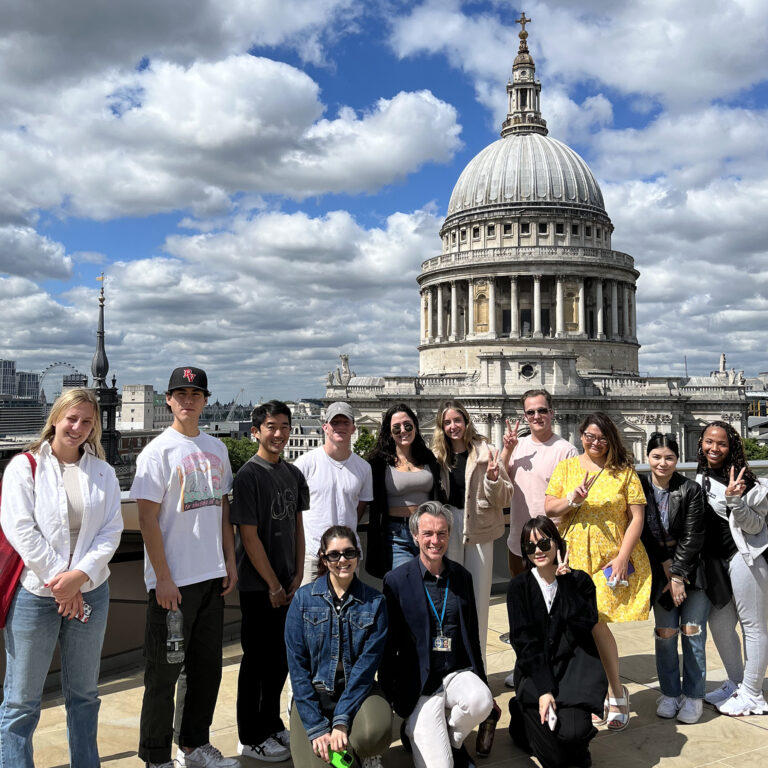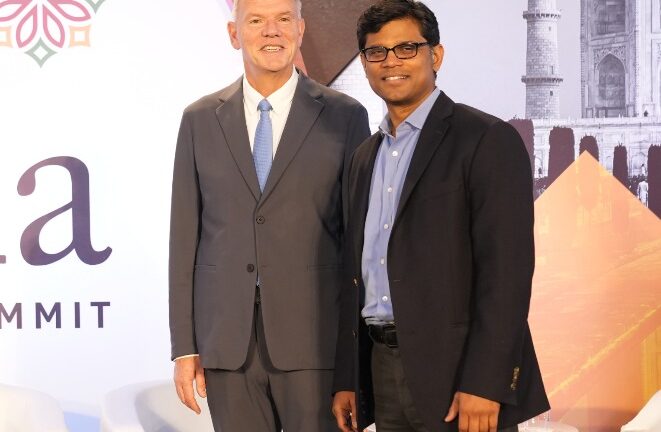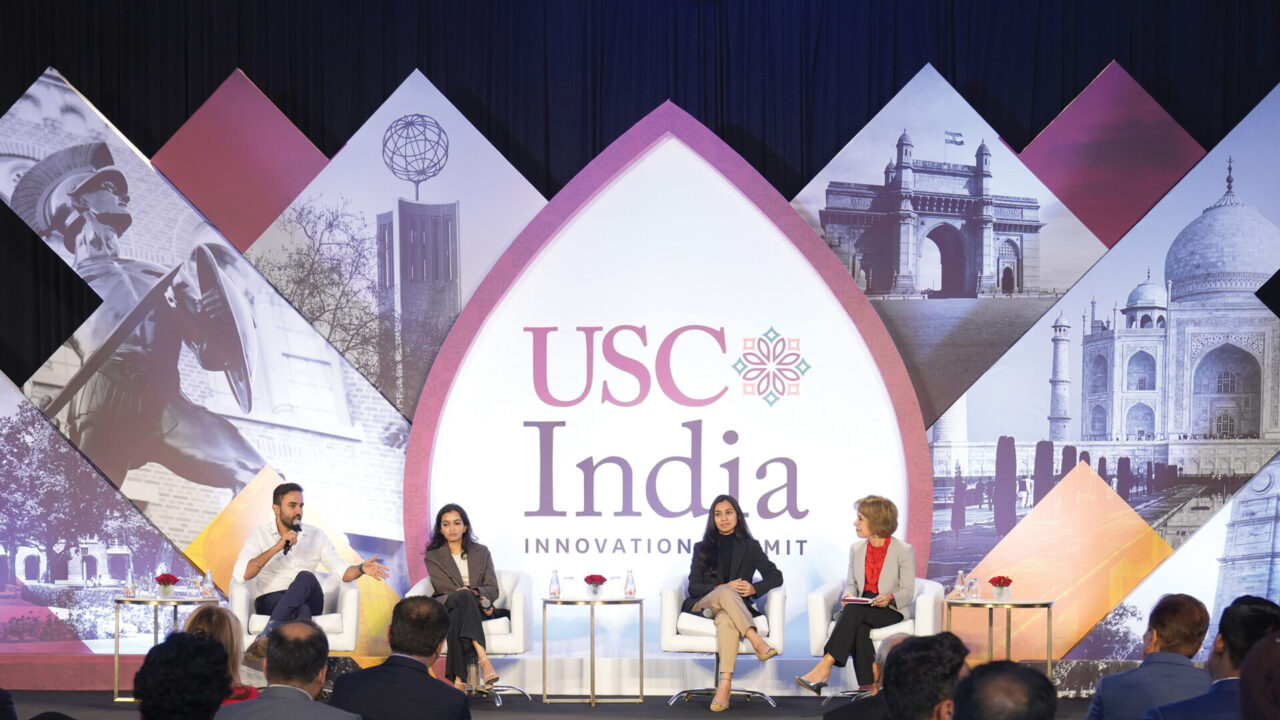
USC President Carol Folt (far right) participates in the early career alumni panel at the USC India Innovation Summit. (Photo/Little Conversations)
‘USC-India: Partner the Future’ Trip Deepens Decades-Long Professional Relationship
With “USC-India: Partner the Future,” President Folt leads delegation of deans, researchers and administrators on three-city tour.
“The school of schools for the country of countries.” That’s how USC President Carol Folt framed her first visit to India last month in an effort to ramp up the university’s long-standing and multifaceted relationship with the country.
Folt led a delegation composed of deans, faculty researchers and senior administrators on a three-city tour touting the strengths and advantages of USC as a university and research partner of choice for Indian students, businesses and government organizations. Branded “USC-India: Partner the Future,” the trip built on an educational and professional relationship with the country that is more than 50 years in the making.
During the tour that featured an innovation summit, panel discussions and alumni events, Folt and her delegation met with dignitaries, business and academic leaders, hundreds of university alumni, and Indian journalists in Mumbai, Bengaluru and Delhi.
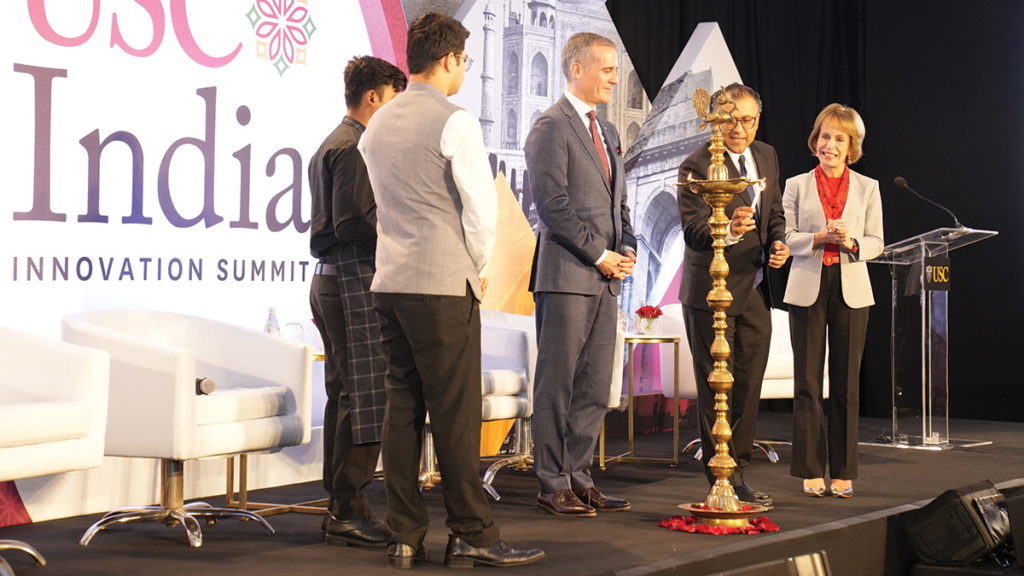
“The time is right now to supercharge the USC-India global partnership,” Folt said to reporters, Indian officials and USC community members. “Through this partnership, our students can develop specialized knowledge and a network of support necessary for launching new products or new businesses, for shaping policy or inventing solutions to challenges in health care, sustainability, science and technology.”
In expressing her desire to create the West Coast hub for a two-way, American-Indian collaboration, Folt stressed that USC intends to continue to find ways to build partnerships with entities based in India. USC, offering a major global research center in the heart of one of the world’s most dynamic intersections of tech, art and culture, provides Indian students and partners with opportunities unparalleled by any other university.
The trip built upon existing, long-standing relationships across many fields — including technology, business, medicine and urban sustainability — to position USC as the West Coast hub for India partnerships and collaborations.
Through the partnership, USC and Indian institutions aim to establish a mutually beneficial two-way expressway for Indian students to learn at USC, and for USC students to study in India across all academic disciplines. Partners hope to drive innovation, as well as encourage new international collaborations in business, lab research, the arts and on screen. USC also hopes the partnership will foster research discoveries for new scalable solutions for sustainable energy and technologies, green medicine and other issues that unite both countries against shared global challenges.
The collaboration will also serve as a vehicle through which to pilot and test new ideas in science, engineering, emerging computing, artificial intelligence and technology that challenge conventional thinking and act as an incubator for experimentation and development to shape industries of the future.
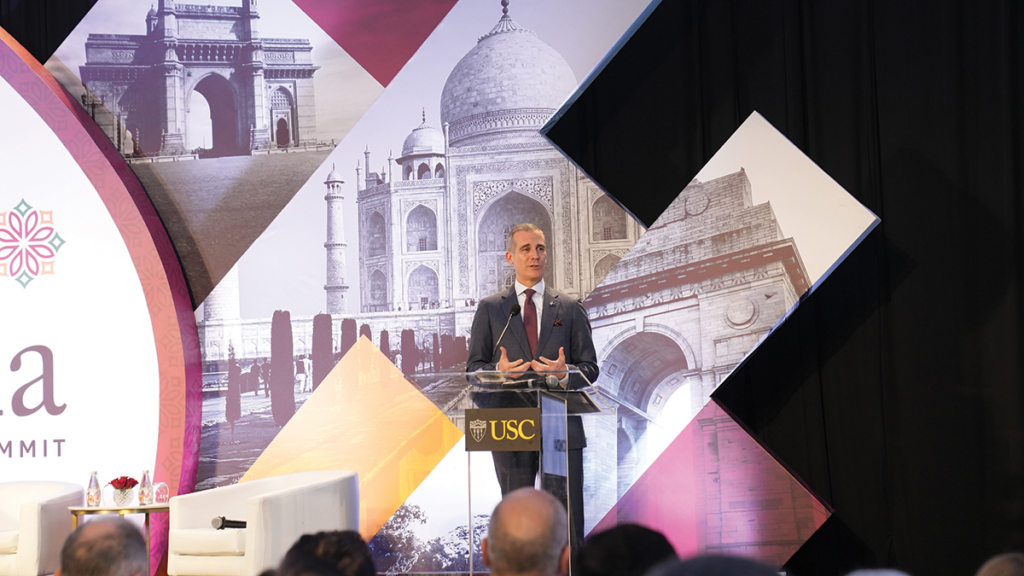
During the trip’s Innovation Summit in Mumbai on Jan. 16, attendees joined Folt, U.S. Ambassador to India Eric Garcetti and industry leaders for presentations and panel discussions. Topics included the role of higher education in supporting India’s initiatives, the importance of an innovative mindset for early-career success, and how the collaboration between India and the USC School of Cinematic Arts is creating future media makers.
USC deans turn momentum into action
Several USC deans and faculty who have already been conducting research and collaborations with partners in India — including USC Viterbi School of Engineering Professor Ishwar Puri, senior vice president at the USC Office of Research and Innovation; and Anthony Bailey, vice president for strategic and global initiatives — joined Folt to share specific actions their schools are planning or implementing to fulfill the goals of the Partner the Future mission.
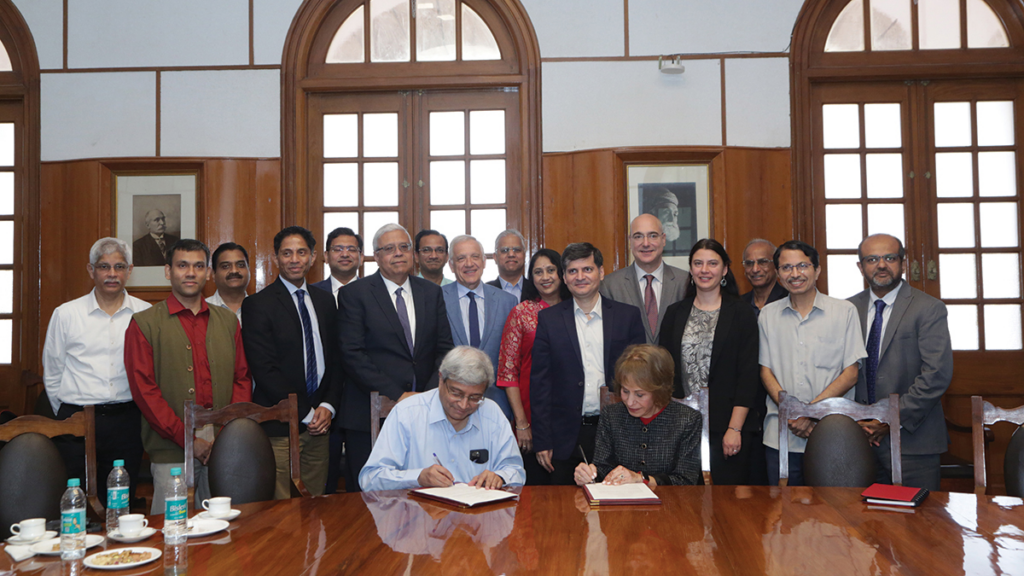
This included the announcement that Gaurav Sukhatme — who has been the executive vice dean of USC Viterbi — will now serve as the inaugural director of the USC School of Advanced Computing, USC’s newest school. Sukhatme, who was born and raised in India, aims to position USC as one of the leading sources of tech talent on the West Coast. Meanwhile, USC Marshall School of Business Dean Geoffrey Garrett announced a new memorandum of understanding with one of India’s premier business schools, BITS School of Management in Mumbai. In addition, Folt announced a universitywide memorandum of understanding with the Indian Institute of Science, Bengaluru.
New partnership mirrors USC goals for excellence
The Partner the Future mission incorporates objectives that complement the “moonshots” Folt has established for USC, which aim for strategic growth and to capitalize on the university’s strengths across research and education. These moonshots include USC Frontiers of Computing — a more than $1 billion initiative that supports the ethical advancement of artificial intelligence and robotics. Transforming Health Sciences encompasses health, economics and policy sciences, and biomedical research. The Sustainability moonshot comprises the university’s efforts to reduce its carbon footprint and invigorate research across biological, chemical, earth, environmental and medical sciences; business and engineering innovation; and policy.
In addition, USC is establishing itself as a prominent, competitive institution for world-class scientists and engineers; the development and innovation of drug therapies, devices and technologies; and the recruitment of students — a moonshot dubbed USC Competes.
A top choice among Indian students
In remarks throughout her trip, Folt emphasized similarities between Los Angeles and Mumbai, which have been sister cities since 1972. USC routinely ranks as a top choice among Indian students and draws the third-largest group of students from the country among the 71 public and private U.S. universities that are members of the Association of American Universities.
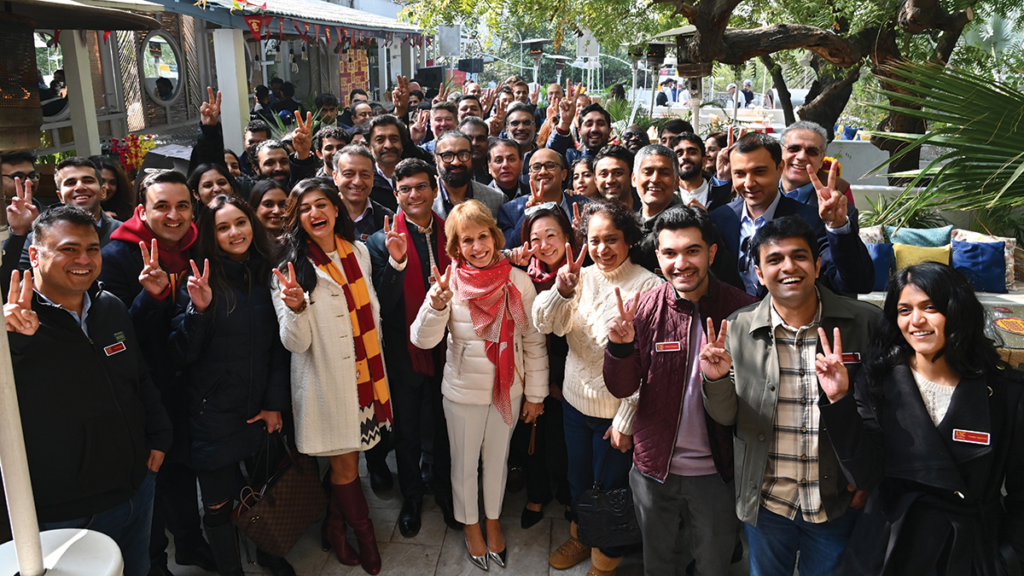
This fall semester was no exception. Nearly 2,700 students from India are enrolled at USC — marking a 36% increase in Indian enrollment since fall 2019 (pre-pandemic). Indian students now represent 21% of the university’s international enrollment, which was 12,753 this year.
“As a global leader in both education and research, we believe that the bridge between USC and India will provide thousands more students from India with opportunities to pursue their dreams, positioning them to influence development, economic growth, policy and innovation at home and worldwide,” Folt said.
This year, an estimated 320 of USC’s undergraduate students are from India. University records show many are on the academic path to degrees in business administration at USC Marshall; cinematic arts, film and television at the School of Cinematic Arts; and computer science and electrical and computer engineering at USC Viterbi.
Another 2,300 USC students from India are enrolled in advanced degree programs. Among the most popular are chemistry at the USC Dornsife College of Letters, Arts and Sciences; computer engineering, data science and electrical engineering at USC Viterbi; and pharmaceutical sciences at the USC Alfred E. Mann School of Pharmacy and Pharmaceutical Sciences.
The growing Trojan Family
When students from India first arrive at USC, they have a network waiting for them. They can join the university’s largest student organization, the Association of Indian Students, whose roots go back to the early 1970s. Over the years, the association has brought together students and hosted cultural celebrations such as Diwali and Holi. Even cricket, India’s most popular sport, has a home at USC through the Trojan Cricket Club. Established in 1992, this club is one of the top five sports clubs at USC, consistently attracting around 200 new members annually.
For decades, deans and faculty of USC Viterbi, USC Marshall and the School of Cinematic Arts have been building a bridge to India in the form of programs, exchanges and visits — all in the lead-up to this formalized and expanding partnership.
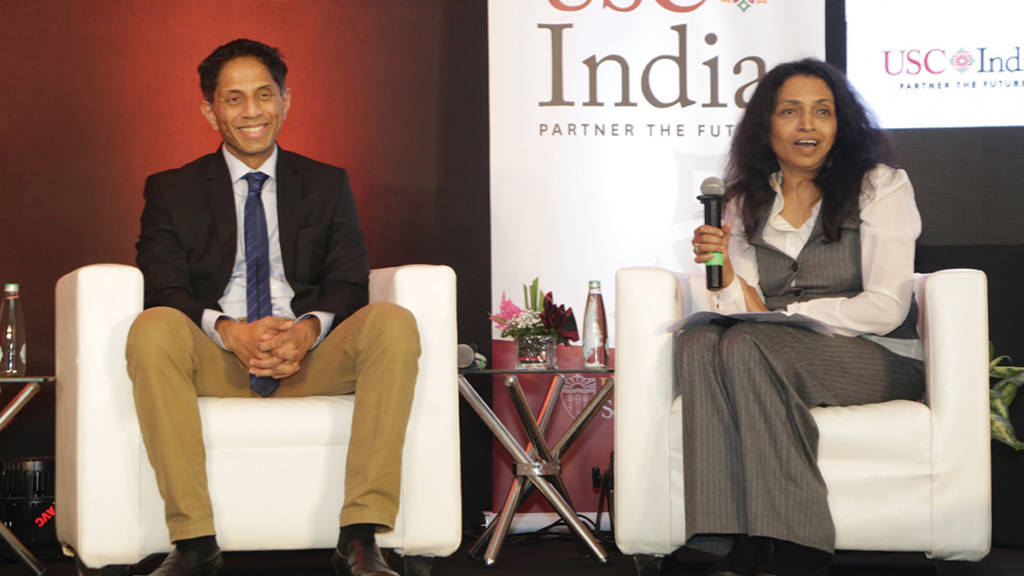
For instance, USC Viterbi has partnered with the Indian Institute of Technology at several campuses across India, including in Mumbai, Madras, Kharagpur and Delhi. For years, the school has had a board of councilors in India, and it has collaborated with Axilor Ventures to provide insights to emerging entrepreneurs and startups.
“We have cultivated partnerships that allow us to connect with students in a very personal way with mentors on our faculty, with alumni and others,” Yortsos said. “When they come to USC, they develop a connection, as well as an expertise — whether that is computer science or quantum computing — that supports them on their journey to success.”
USC Marshall has also developed programs for students in India and at USC.
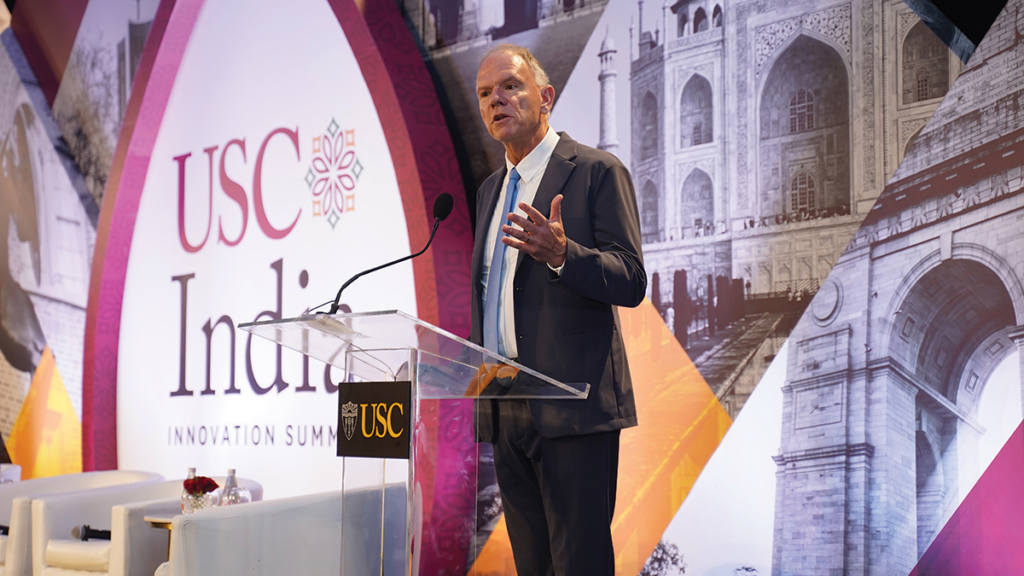
“The USC-India partnership will provide a vital pipeline of opportunities for our students and faculty to engage with Indian business leaders, investors, experts and the global Trojan network,” Garrett said. “This partnership will unlock new potential for innovation and further cement USC as a premier destination for global education.”
Meanwhile, the School of Cinematic Arts has developed new partnerships in India and has a historic link to Indian film in the late alumnus Ellis Dungan, a pioneering director often credited with revolutionizing India’s early Tamil cinema.
“Cinema has long been a key part of India’s arts and popular culture,” School of Cinematic Arts Dean Elizabeth Daley said. “Movies offer a lens through which we can examine and understand what it means to be human. Our countries are lucky to have vibrant film industries that offer cultural context, cross-cultural understanding, and, yes, a healthy sprinkling of magic and glamour.”
According to Folt, the university plans to formalize additional partnerships — including one in Hyderabad — that could lead to additional opportunities for students.
Folt described the energy of the fast-paced trip as “kinetic” during a meeting with alumni and industry leaders in Mumbai.
“When we ‘Partner the Future,’ we will create new opportunities and unite humanity to take on some of the most pressing global challenges of our time,” she said. “We’re grateful for your support, energy and dedication in bringing the USC spirit to India.”
